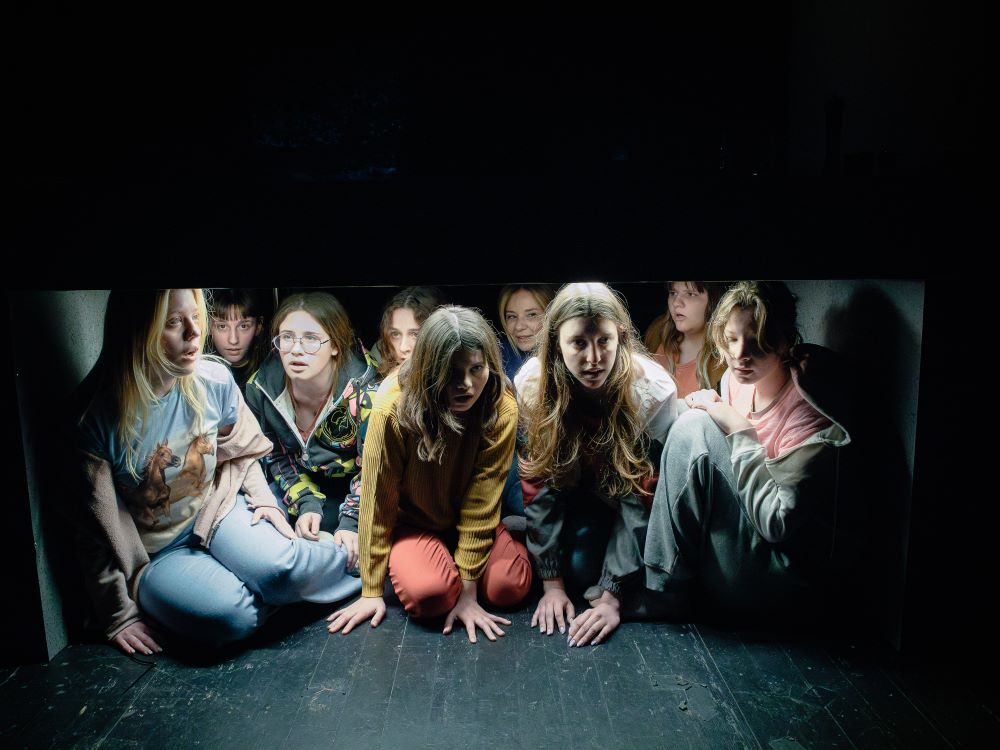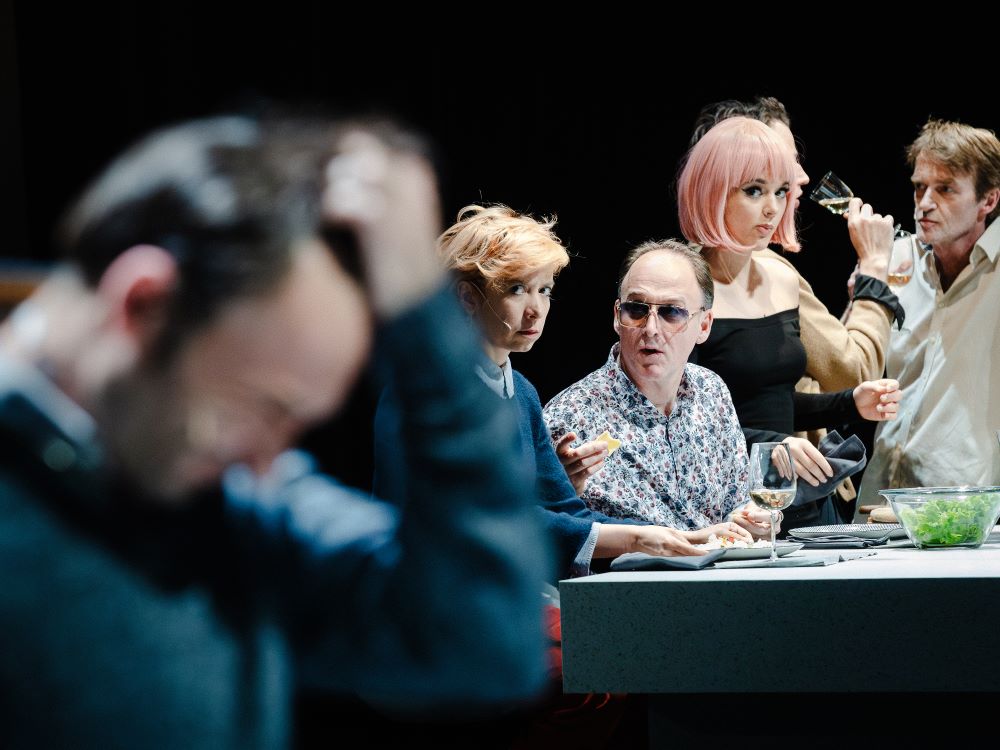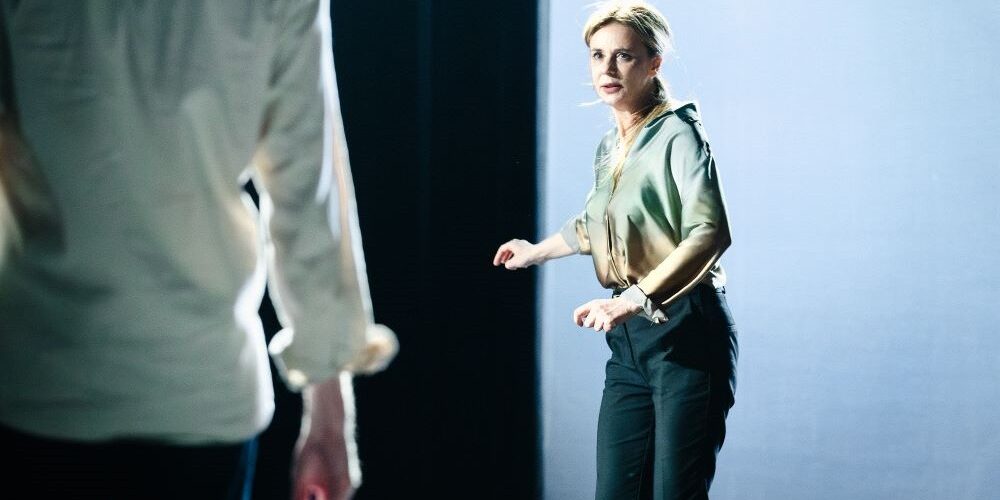Zagreb Youth Theatre, premiere 26th April 2024
Why do the rich partake in philanthropy? Does every apparently selfless act have a selfish motivation? If so, does that make it any less valid? These questions are central to ZKM’s latest show Angel of Ice written and directed by Hungary’s persona non grata Árpád Schilling.
The play’s subtitle The Purifying Power of Good Intentions ominously indicates that to the audience that something tectonic and cathartic will happen to the main protagonist Clara (played by Nataša Dangubić), a renowned TV political journalist who decides to quit her current career and takes up charity work at a correctional facility for girls.
Angel of Ice focuses on Clara, her husband Diego (Filip Nola) and their son Caspar (Luka Knez). In the first part of this three-hour long performance we spend a lot of time (arguably too much time) being introduced to Clara, her family, her past, her work and her relationships with the people surrounding her. Through interactions with other characters, it becomes clearer that Clara is an exceptional human. The second part of the show is more reminiscent of Michael Haneke’s Funny Games, in that a stranger’s presence in a rich family home causes all three of them to face their deepest fears and desires – although here there is no explicit physical violence.
As Diego tells us in his opening monologue, his wife cannot lie because she grew up in a family that faked its happiness. Her late father, the famous actor Johann Urman (Milivoj Beader), continuously cheated on her mother Ila (Doris Šarić Kukuljica). Because she didn’t want to keep living in a fabricated reality, at fifteen Clara went to boarding school. We soon learn a disturbing truth about her father – that he molested, abused and (most likely) raped a number of young women during his career. Beader’s performance in the play is similar to the role of Zosima, the character he plays in Oliver Frljić’s Brothers Karamazov where, for the most part of it, his ghostlike presence casts a shadow, hinting that something hidden will be revealed. The same could be said about the character of Linda (played in alternation by Elizabeta Brleković and Veronika Moćan), the teenage girl from juvenile facility that Clara takes a special interest in. This uncanny atmosphere looms over Clara’s character and beyond, it takes toll on both her husband and son, each of them with their own demons to fight (as well as with each other).
Dangubić’s performance as Clara is masterful, her portrayal of a charismatic, hyper-independent privileged woman is energetic and convincing. Her eloquence always best comes to light when she clashes with her colleagues on stage – her monologues are like gunshots, never missing the point. In contrast to his over-achieving wife, Diego is an average human and a rather incompetent father figure who never fully severed his umbilical cord with his mother Andrea (played by Dora Polić Vitez). As Diego, Nola seamlessly captures the warm facade of a man who wants nothing more than his wife to be intimate with him again. Like his parents, Caspar’s character is also ambiguous. An anxious freshman who realises he cannot live on his own, away from home, shows aggression towards Linda when she comes to spend a night in their house on his mother’s request.

Angel of Ice, ZKM
The most striking scene was the conflict between mother and son, during which Clara dismisses Caspar’s anxiety and wish to return home, rubs his privileged upbringing in his face and claims he was a happy child because that’s how she thought of him. In the play, the dialogue often takes the form of long monologues during which the actors keep talking over each other without stopping until they say what’s on their mind. This nicely captures how arrogant and hypocritical the characters are, particularly those who come from wealth.
The hypocrisy of the rich is most clearly depicted in a scene which takes place at a charity party. It’s properly obnoxious and cringe-making to watch. Clara decides to host the party in order to raise funds for the reconstruction of the correctional facility where she volunteers. Diego gives a speech about how feelings of shame and fear follow us through life. Linda and other girls perform a song they wrote themselves about how they don’t want pity, they just want to be respected as humans beings, while a video plays that shows just how decayed their home is. The facility’s director Vaiva (Nadežda Perišić Radović) gives an awkward speech thanking everyone for the donations while chewing out the girls, describing them as liars, as if saying they don’t deserve the help and attention they are supposedly getting from her staff.
The discourse on children in this play can be summed up in Vaiva’s reoccurring sentence that her job is to raise other children, even though she has her own. This hints at the dynamic Clara has with Linda that is far too emotionally intimate in comparison to her relationship with her own son, Caspar. With him, Clara is cold and distant, she shows no compassion or understanding for the crisis he is experiencing concerning his studies abroad. She even goes so far as to belittle him in front of Linda in their home.
Yet, Clara shows warmth and care to the girls, especially Linda, a total stranger to her. This careless approach will backfire on Clara because she let Linda film her house and all the confessions Clara, Diego and Caspar made. The live recordings from Linda’s mobile phone are projected on the tall back door of the stage in a way that makes it possible to see the actors’ facial expressions clearly, regardless of which way they are facing.

Angel of Ice, ZKM
Linda’s character reminded me of Ibsen’s play Little Eyolf where a child also plays a role of a stranger in a home whose presence slowly but steadily nibbles at the already rotten household. In end, the three of them, Clara, Diego and Caspar, sit alone in silence at their kitchen island, eating breakfast, continuing to repress the traumas and intense emotions that this girl triggered in them.
The play is performed in ZKM’s main hall and uses its depth entirely. The simple yet sophisticated stage design by Ivan Marušić Klif and Nataša Kanceljak suits the rich environment of the main characters while giving off a cold and eerie vibe. However, the space is empty for most of the time, with the most of the
performance being in the proscenium. The production also makes full use of ZKM’s acting ensemble with even students from ZKM’s drama studio taking part.
Despite very strong performances from the three main actors, this theme of ‘purifying power’ slipped away somewhere during the three hour long duration of the Schilling’s play. The build up towards the cathartic culmination of the play takes too long. The addition of more characters and plot points takes the focus away from Clara and her family. Angel of Ice tells an interesting story and the performances of the main actors are superb, but the sheer amount of scenes means that, overall, Schilling’s production falls pretty flat and feels watered down. The extra material feels like padding which takes away from the play’s essence.
Credits
Author and director: Árpád Schilling//Translation: Xenia Detoni//Dramaturg: Katarina Pejović//Costumes: Zdravka Ivandija Kirigin//Scenography: Ivan Marušić Klif and Nataša Kanceljak
For tickets and further information, visit: ZeKaEm.hr
Nora Čulić Matošić (1998) is a student of Comparative Literature (MA) at the Faculty of Humanities and Social Sciences in Zagreb. She has written theatre criticism for the Croatian radio programme Theatralia and web portal Kulturpunkt.hr. Besides theatre, her interests are other forms of performing arts (particularly dance performances) and film.








